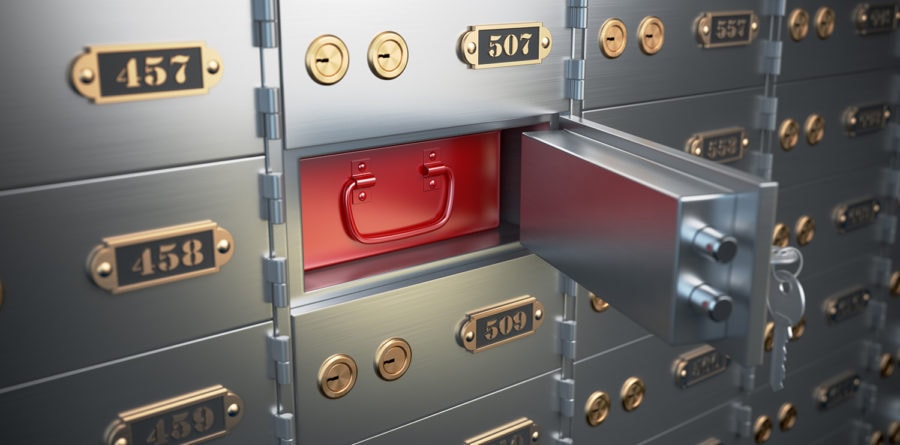
Can you keep gold coins in a safe deposit box - think
More: Can you keep gold coins in a safe deposit box
| Can you keep gold coins in a safe deposit box | 540 |
| Can you keep gold coins in a safe deposit box | 412 |
| Hypercash coin | Are gold coins a good investment uk |
| Can you keep gold coins in a safe deposit box | 103 |
| Can you keep gold coins in a safe deposit box | Dragonpay gcash to coins |
How to Properly Store Your Coins
Many people go through extensive measures to ensure their gold and silver bullion – bars, rounds, and coins – are safely secure from theft or confiscation. However, most don’t consider the outcome of their extensive measures when it isn’t properly stored. It may be safe from theft, but it doesn’t mean your investment is fully protected. So is there really a right or wrong way to properly store your coins?
Properly Store Your Coins – Security
When buying precious metals, you are faced with the critical question of where you are going to keep your investment stored. Finding safe storage is especially important for your gold and silver valuables. There’s a few options people choose to do:
- Secret Storage – i.e. under floorboards, in attics, a shoe box in the closet, buried in the backyard.
- Safes – i.e. small fire and waterproof, carriable safes to as tall as your door jeweler style safes
- Banks – whether it is your local bank or a credit union. Some people opt to store their gold and silver in safe deposit boxes.
- Precious Metal Depositories – Choices for securing your valuables are typically segregated or communal. High security.
But which options are going to protect your precious metals from all threats – theft AND environmental??
Properly Store Your Coins – Environmental
Wait. Environmental? Why do I need to worry about that? Well, if you decide to bury your gold or silver outside, Mother Nature can be a trickster there. While she is quietly and safely protecting your gold or silver from theft… she is wreaking havoc on your investment. Thus affecting your payout when you choose to cash in on those silver coins, gold coins, silver bars, gold bars, etc. Where a higher price or even premium would have normally been given, a melt or scrap price is all you will end up with. For some that isn’t an issue, for others, it can be devastating. Is that a risk you’re willing to take?
When precious metals are stored underground, they are subject to the elements of nature. Subjecting them to humidity, moisture, oxidation. All of which leads to green spots, corrosion, and ultimately, pitting. Let’s discuss these precious metal plagues further.
Green Spots:
Storing your coins in soft plastic flips or other plastic coin holders that contain PVC can subject them to chemical reactions. What is PVC? PVC is polyvinyl chloride. It is an additive used in plastics to make the material more pliable and less brittle. When it is left on a coin or your coins are contained in a PVC tube, they are left to chemically interact. Creating a slightly acidic reaction. In which causes residual deposits to appear on the coin’s surface. PVC damage appears as greenish, milky, or grey streaks. Or a haze. In severe cases, it looks like tiny green blobs on the surface of the coin. In coin collecting, PVC is most frequently encountered in the clear plastic flips in which coins are stored. Occasionally it happens in the off-purchase tubes.
If the PVC residue on the surface of the coin is removed soon enough, the coin may escape with minimal damage that is not visible to the naked eye. If the green PVC residue is left on the coin for a long time, it will start eating into the surface of the coin. When the green PVC residue is removed, it will reveal the extent of the damage. In extreme cases, this will leave a series of microscopic pits and indentations that cannot be repaired.
Copper coins are most vulnerable to PVC damage. Followed by silver. Gold coins tend to be more resistant to this; however, precautionary measures should still be taken.
Corrosion:
Corrosion on coins occurs when your coins are stored in or near damp or polluted environments. Even humidity plays a role. No matter the degree of dampness or humidity. Whether they are wrapped in plastic, or in tubes, they can still be subject to corrosion. Corrosion occurs when the coins become moist in any degree. Especially when they are buried in the soil. Corrosion occurs through oxidation. This is because the conditions around the metal, promote/support the corrosion process. Often resulting in small salts as well. The result is rusting. That yellow, orange, and red-brown crustation that occurs on most base metals.
Additionally, the effects of pollution can play a role in the corrosion of coins. Even everyday materials. It just depends on the acids in them and how they react to your precious metals. Paints. Textiles. Even naturally decaying animal matter. All play a role in corroding your coin. Hydrogen Sulphide. Which causes cooper and silver to tarnish. As well as, can lend towards rusting.
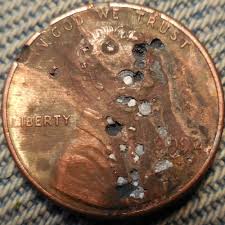
Penny Pitting – After being attacked by corrosion
Pitting:
Pitting is the final “decay” process of a coin. It is when the green spots or corrosion have been attacking a coin for too long. Pitting results in holes. Either partially or fully, through the coin. Once a coin has pitting, it’s value significantly drops.
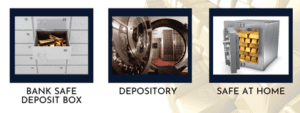 Backtrack to Properly Store Your Coins – Security
Backtrack to Properly Store Your Coins – Security
Now that we know how the Environment can affect gold and silver, let’s re-evaluate how to properly store your coins.
- Secret Storage – i.e. under floorboards, in attics, a shoe box in the closet, buried in the backyard.
- Safes – i.e. small fire and waterproof, carriable safes to as tall as your door jeweler style safes
- Banks – whether it is your local bank or a credit union. Some people opt to store their gold and silver in safe deposit boxes.
- Precious Metal Depositories – Choices for securing your valuables are typically segregated or communal.
Let’s start from the bottom of the list.
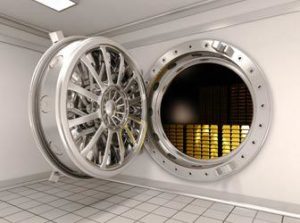 Precious Metal Depositories
Precious Metal Depositories
Providing enough space to house larger collections can be enough for someone to choose a Precious Metal Depository. Offering climate and moisture controlled facilities to ensure that your precious metals are safe from any environmentally detrimental conditions. Some depositories offer two options: Communal or Segregated Storage. Communal means your bullion or investment is stored with others valuables in a commonly shared space. Segregated means yours is stored individualistically. Allowing you to keep your precious metals privately away from others. But please be advised that not all depositories offer two options. Some only offer communal.
However, we understand that not everyone can afford that option. Or even want to choose to store their silver and gold in Precious Metal Depositories – for reasons that they don’t want the government or any other entity to know of their bullion stash. We get it. It opens the door to possibilities of theft or thoughts of confiscation. Even while highly secure, climate controlled, and heavily guarded, it isn’t an option for everyone.
Theft –
If someone can embezzle money from your FSA account, they surely can from your bullion. Even if the depository offers insurance. How much insurance and what it covers should be a high priority question when choosing this route. Others fear government confiscation.
Confiscation –
On April 5, 1933, President Franklin D. Roosevelt put Executive Order 1602 on the table! Basically, private ownership of gold bullion, including bars and coins, was outlawed! Roosevelt’s order stated that “the hoarding of gold coin, gold bullion, and gold certificates within the continental United States” was “forbidden.” By 1934, millions of coins were melted down because of the Gold Reserve Act of 1934.
However, it should be noted that times were different then – it was the heels of the Great Depression. Which started in 1929. By 1933, thousands of banks had closed their doors and millions of people were out of work. The stated reason for the order was that hard times had caused “hoarding” of gold, stalling economic growth, and thus, worsened the depression. However, the main rationale behind the order was actually to remove the constraint on the Federal Reserve preventing it from increasing the money supply during the depression. The Federal Reserve Act (1913) required 40% gold backing of Federal Reserve Notes that were issued. By the late 1920s, the Federal Reserve had almost hit the limit of allowable credit. In the form of Federal Reserve demand notes. Of which could be backed by the gold in its possession.
At this point, we are printing billions of dollars worth of currency at a rate faster than we can populate. Eventually repealed by President Ford and the modern gold bullion coin was born. The American Gold Eagle debuted in 1986. Resulting in a bullion and collector version.
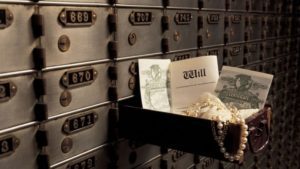 Banks
Banks
Many customers are not comfortable with the idea of keeping precious metals in their home because it can make them potential targets of theft and burglary. Storing your precious metals in a safe deposit box can therefore be appealing. Less worry for you when it comes to safe guarding your valuables. Most importantly, your home. With it also comes the same worries for some, of theft within a bank robbery or again, thoughts of government confiscation. However, the real threat to storing your precious metals at the bank is during an economic crisis or even a personal crisis. As well as, it comes with no insurance.
Banks won’t insurance safety deposit boxes. You would need to purchase your own insurance of it’s contents. Provided you can find a company willing to insure it. It can get costly. Additionally, access to your precious metals is limited. Limited to when the bank is open. If there is an unforeseen bank closure, your precious metals are untouchable until the bank is open.
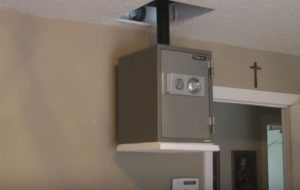 Safes
Safes
Safes can provide a more affordable option for many people. Ranging in sizes from something small and carriable to something that can take up the size of your bedroom. Safes provide a more secure method of storing precious metals in your home. Especially those that require either a combination or digital code to open. Additionally, the larger and heavier they are, the more difficult to move they are. Much less steal. So it should be noted that something within 50 lbs should be nixed. Even 100 lbs.
Safes can also protect your valuables from any potential damages incurred by floods, fire or other natural disasters. There are even certain home insurance policies that will decrease your current rate if you declare the possession of one. The price of a safe can range anywhere between several hundred to several thousand dollars. To ensure that your valuables receive optimal protection against incidents of fire, purchase a UL (Underwriters Laboratories) rated safe of UL-15 spec or higher. If that is the route you so choose. It is pricey, but it is a level of protection, and in some ways, an insurance – on protecting your gold and silver.
Secret Storage
We’ve seen all sorts of hiding spaces in the movies. From hidden walls to small, barely noticeable attic spaces, to floorboards covered with rugs, cookie jars, and socks. To even burying items in the ground. Secret storage is a fun idea. But remember it isn’t always the safest.
Burying in the Ground
- Can cause environmental damage to your gold and silver valuables.
- Most cheap metal detectors can detect 2-4 feet deep into the soil.
- PVC pipes, while providing a trickster to Ground Penetrating Radar, is the #1 destroyer of coins.
- Cisterns and lead pipes – are great places to hide your gold or silver stash; but again, leading them to a demise of diminished value.
Cookie Jars and Socks
- Number 1 place any common thief or robber is going to look. They are looking for cash – but if your gold and silver is in there too!?! They’ve hit pay dirt.
- Easily a removable object. That can be carried or thrown in a bag.
Floorboards
- We’ve all heard the creaky floorboards and with the movies focusing their attention to treasures within them – someone, no matter how rushed they are, will pause to investigate. Possibly unearthing your valuables.
- Does not protect your valuables from humidity or even fire or flooding damage.
I know I’ve given you a lot of cons here to EACH of the options. I’m not swaying one way or another. Or pushing for you to choose one option or another. It is your gold and silver. Therefore, it is your choice on how you choose to store them and where. However, we are here to help you protect your investment. Even if all we can do is offer advice on how NOT to store it.
Vermillion Enterprises does not suggest burying your gold or silver investment. However, if that is the option you go with, please do it properly – for the coin’s sake!
How to Properly Store Your Gold and Silver
Protecting Against the Environment
- Make sure your coins and bullion are stored in tubes that do not contain PVC.
- If you have a lot of 40% Silver and 90% Silver Coins, storing in tubes might not be an option. However, putting them in a soft sided cooler first could be an option.
- Place silica packets – you know the ones that come with new shoes – in your soft sided cooler with the coins.
- You can also use baking soda, charcoal pouches, and cat litter. However, you should replace baking soda, charcoal pouches, and cat litter every six months.
- Place those tubes, or soft sided coolers, in an airtight container. Again, steering away from PVC. A good choice is ammunition boxes or shotgun cartridge boxes. Both are made of metal and typically have a rubber gasket at the hinged lid to protect from moisture damage. If not, lining the inside of the box with a rubber matting can help.
- A larger hard shell cooler can be used as well. You will want to place silica packets, baking soda, charcoal pouches, or cat litter in a jar, in there as well.
Another great option is purchasing American Silver Eagles in sealed Monster Boxes. You get sealed tubes within an airtight container. All you have to do is make sure it is stored safely somewhere.
Protecting for Security
Burying in the Ground
If you are a die hard bury it in the ground – Midnight Gardener kind of person. There is nothing wrong with that. We just suggest you take more precautions than most. First, protect against the Environment. Then protect against the environment some more. How?
Burying your valuables in your yard to avoid detection will take 5 ft or more depth. Do you really want to dig that deep to first bury it and then second uncover it to resell it? Do you have a storage shed in your backyard? Use the old floorboard thought process but take it up a notch. You’ll have convenient, but hidden access to your gold and silver – day or night. Without having to unearth a bunch of dirt. Over and over again.
- Dig out a square section large enough to place your well protected gold and silver valuables plus a lot more.
- Pour concrete to make walls.
- Line with rubber matting.
- Place kitty litter or baking soda in your homemade vault.
- You can either make a concrete lid with a lift handle, or if you’re feeling froggy – a hinged one.
- Cover the section with a rubber mat.
- For added protection, place a bucket or two of kitty litter near by. Keep some sandbags on hand in case you need to prevent flooding into your shed.
Does Concrete Absorb Moisture?
Yes, concrete can absorb water because it’s porous like a sponge. When the ambient relative humidity is high, concrete can absorb water vapor (moisture) from the air. When the relative humidity is low, water will evaporate from the concrete into the ambient environment.Therefore, keeping kitty litter or baking soda inside will absorb the extra moisture when the humidity is low and keep it away from your environmentally safely stored gold and silver valuables.
Not a Midnight Gardener Kind of Person?
That’s okay! There are other ways to properly store your gold & silver valuables without spending a ton of money on a safe, a deposit box, or Precious Metals Depository.
First and foremost, make sure your have secured your valuables from Mother Nature. Inside of homes also have humidity and PVC. Factors that can affect your precious metals. Remember – airtight, waterproof. Okay. Now where to you store this?
- Remove Captain Obvious: That means, no fake cookie jars. No rocks or carved-out books. Each is way too common. If you’ve seen your hiding spot in a movie, find another one. Immediately. Think of places where a plumber, electrician, gardener, or maid won’t stumble across your stash. Put some thought and creativity into it. I know you have it in you!
- Three Layers Deep: Most burglars look for things they can grab and go. Easily findable. Easily portable. Be mindful of this. Store your silver or gold three layers deep. For example, a floor safe covered by floorboards with carpet, and a china cabinet over it.
- Deterrents: Deterrents, or decoys, are also a good way to distract from what you have.
- A jewelry box with costume jewelry.
- A small carriable, easily accessible safe with costume jewelry, small bills, silver-plated or gold-plated coins (not the plastic ones from the dollar store), or even little trinkets.
Final Words on to Properly Store and Secure your Gold & Silver
Remember, there is no fail safe to securing your valuables. Whether you buy stocks or bonds or physical bullion. There is always a risk. Most often, out of our control. Whether it be a hurricane, a flood, a wildfire. A home invasion, a robbery, or a trusted friend. A market crash, a global crisis, or economic failure. None of it comes with a guarantee. The risk involved are what each needs to be prepared and educated on. Each is just a “what if”.
The only thing that isn’t a “what if” here is science backed. It is the damage that can come from improper storing of your gold and silver bullion, coins, jewelry, etc. You don’t have to be a science class star to know the effects of the environment in which your precious metals are stored can play a role. Just know the risks involved in how you store them, and that there are coin-safe, bullion-safe, ways to store your items without destroying them.
Subscribe
Subscribe to our e-mail newsletter to receive updates.
.999 silver, 1 oz silver, 10K Gold, 14K Gold, 18K Gold, 22k gold, 24K Gold, 40% silver, 90% silver, 9k gold, AGB: AMERICAN GOLD BUFFALO, AGE: AMERICAN GOLD EAGLE, american silver, american silver eagles, ASE, AUSTRALIAN GOLD LUNAR, AUSTRALIAN GOLD NUGGET, AUSTRIAN GOLD PHILHARMONIC, bags of coins, banks, brooksville, brooksville fl, buy american gold eagles, buy gold, buy silver, buying american silver eagles, Cash For Gold, coin bags, coin corrosion, coin dealer, coin shop, coins, confiscation, corrison, daytona beach, daytona beach fl, depository, dimes, environmental, fl, fractional gold, franklin half dollars, gold, green spots, half dollars, hernando county, How to Buy American Silver Eagles, hudson, hudson fl, investment, investment silver, IRA Eligible Gold, kennedy half dollars, land o lakes fl, land o' lakes, landolakes, local gold dealer, local gold seller, monster box, new port richey, new port richey fl, no digging, odessa, odessa fl, orlando, precious metal depositories, precious metals, protect your investment, pvc, quarters, safes, security, sell gold necklaces, sell silver, selling american silver eagles, silver, silver bars, Silver Bullion, silver coins, silver rounds, sping hill fl, spring hill, storing your investment, theft, trinity, trinity fl, walking liberty half dollars, winter springs, winter springs fl
-
-
-